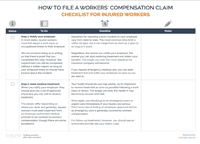When to call a lawyer for your New Hampshire workers’ compensation claim
New Hampshire’s official slogan is, “Live Free or Die.”
It comes from a toast written by Revolutionary War General John Stark in 1809. He had to decline an invitation to a reunion of the Battle of Bennington because of his poor health, so he sent a letter that included, “Live free or die: Death is not the worst of evils.”
While that might be true for some people in some circumstances, it’s definitely the preference of most people to try to avoid death as best they can.
And no one wants death to happen as a result of a workplace accident.
New Hampshire workers’ compensation laws
That’s why the New Hampshire workers’ compensation system is designed to benefit both employees and employers. As an employee, if you’re injured at work (whether on- or off-site, as long as you’re doing your job at the time of the injury), you’re entitled to receive benefits to cover medical treatment, lost wages and related expenses.
The benefit to the employer is that if a worker receives workers’ compensation benefits, they can’t file a personal injury lawsuit for the same injury. This spares the employer from a lengthy and time-consuming legal battle (and possibly unwelcome media attention).
Workers’ compensation is no-fault insurance
To make a workers’ compensation claim, you need to prove that:
- You were at work when the accident or injury happened. If you were at work, the injury could be anything, whether or not it’s related to your job. For instance, you could trip over an electrical cord while walking from your desk to the bathroom... and your injury would be covered under workers’ compensation; or
- You were at an off-site location, but engaged in duties related to your job. For instance, if your job takes you to clients’ homes or offices, other corporate sites, construction sites or properties, or anyplace else. If you’re injured while performing tasks associated with your job, your injuries should be covered under workers’ compensation; or
- Your illness or disease was caused by conditions related to your work. Workers’ compensation also covers conditions or illnesses that develop gradually over time. This might be something like respiratory illness from breathing toxins or chemicals; hearing loss from exposure to prolonged loud noise; or back, neck, or other musculoskeletal problems because of heavy lifting, twisting, or other positional issues.
Once you’ve proven that your injury is work-related, you need to prove that you’re actually injured and that the injury cost you money.
Unlike a personal injury lawsuit, you don’t need to prove fault or negligence. The fact that the injury happened, and that it’s work-related, is enough to receive benefits under New Hampshire workers’ compensation law.
Note, however, that if your illness or condition is the result of a long-term exposure or condition, it could be more difficult to prove that it’s related to your work. If this is the situation, you likely should contact a New Hampshire workers’ compensation lawyer. Your lawyer has strategies and experts to prove that your injury was caused by a work condition and that there’s no other way the condition could have developed. They’d need to rule out the possibility of it being a genetic condition, exposure elsewhere (at home or in another workplace, for instance) or other ways that you could have developed the illness, and that the level of exposure at work would cause the symptoms you’re experiencing.
New Hampshire workers’ compensation employee benefits
If you’ve experienced a work-related injury in New Hampshire, these are the benefits you can claim through workers’ compensation:
Weekly indemnity benefits
Average weekly wage is determined based on the gross earnings of the injured employee during the 26 weeks preceding the injury and dividing by the total number of weeks. The employee may calculate up to 52 weeks prior to the accident.
The weekly compensation rate under New Hampshire workers’ compensation is 66 ⅔% of the average weekly wage. If the injury was after February 8, 1994, the rate is calculated using 60% of their average weekly wage but can’t exceed 100% of their earnings.
If an employee is employed by two or more employers, they can receive indemnity benefits from all employers. This can include unreported earning, uninsured self-employment, federal and other employment that’s not subject to New Hampshire workers’ compensation law.
Temporary partial disability benefits
If your work-related injury left you unable to work at the job you had before the accident for a period of time—but not permanently—you can earn 60% of the difference between your prior earnings and post-injury earnings. You can collect this benefit for 262 weeks.
There is a three-day waiting period for payment of disability benefits. If the disability exceeds 14 days, then the period is waived and you can receive payment for those days.
Death benefits
Surviving family members of a person who dies in a work-related injury can receive benefits.
A surviving spouse who is not remarried may receive benefits, along with a dependent child until the child becomes 18 years old, or if the child reaches age 25 and is a full-time student. If the child is self-supporting, marries or is legally adopted, they can no longer receive benefits. A dependent child who is mentally or physically incapacitated may continue to receive benefits.
A dependent who is not the widow or child may receive benefits until they are married, legally adopted or self-supporting.
Medical treatment and transportation
The injured worker may recover costs for medical treatment, including costs for transportation to medical appointments. The workers’ compensation insurance company has 30 days in which to either pay the provider or deny the bill. A denial must be sent to the provider, the patient, and the Labor Department with a reason for the denial and advise the employee of their right to request a hearing.
Permanent impairment award
If the injury caused you to lose use of a compensable body part (as listed by law), then there is a specific number of weeks that you can receive compensation based on what the law allows. There is a 350-week schedule for whole person impairment.
Permanent impairment is calculated based on:
- Percentage of loss multiplied by the number of weeks
- Number of weeks multiplied by compensation rate
- The total dollar amount of the benefit.
The example provided by the New Hampshire Labor Department is: 10% loss of an arm would be .10 x 210 (arm) = 21 weeks of benefits times the compensation rate of $325 or a total of $6,825.
To be considered permanently impaired, you would need to have reached maximum medical improvement. In other words, the doctor does not believe there is potential for future improvement to your condition.
Temporary alternate position
If your employer has five or more employees, it is required to provide temporary alternative work for an injured person. The employer must review the employee’s duties prior to the injury and develop a plan to help them return to work in a capacity that allows them to do a job that compensates for their injured condition until they are able to resume their normal work.
Reinstatement to previous position
If the employee is able to return to their job, the employer must reinstate them to their former position within 18 months of the injury.
Cost of Living Adjustment
An employee is entitled to a cost of living adjustment to the weekly compensation if they are receiving total disability benefits. This would happen after three years of workers’ compensation payments, if they’ve been denied Social Security benefits and if they receive less than 60% of the current state average weekly wage.
Vocational Rehabilitation
The New Hampshire workers’ compensation system also provides job retraining services. You’re required to look for work once your doctor gives you a work release, and if you need help learning a new job or relearning an old one, there are services available.
What to do if your claim is denied
Sometimes a claim is denied for a reason like insufficient medical documentation—not on the merits of the claim. It’s always worth pursuing it further in order to receive compensation. You can request a hearing at the Department of Labor to dispute your claim’s denial. The Department reports that nearly half of injured workers who make an appeal win at their hearing. You can request a hearing for up to 18 months if your clam is denied.
Do you need a New Hampshire workers’ compensation lawyer?
It’s important to note that you don’t need to pay a workers’ comp lawyer up front. Instead, the attorney receives 20% of your unpaid disability benefits if they win the appeal. If the lawyer loses the appeal, you do not pay them.
You have up to two years from the date of your injury in which to make your claim, but it’s best to do so as soon as possible.
When you seek treatment for a work-related injury, be sure to let the doctor or provider know because they will need to send the bills to your employer or workers’ compensation insurance carrier, not your regular health insurance company.
If your work-related injury is easily treated and you make a full recovery quickly and can return to work, you might not need a workers’ compensation lawyer. But if the injury will require long-term or future medical care, or if you’re disabled or expect to be out of work for a long time, it would be a good idea to consult an attorney.
Your attorney will work with medical experts and financial professionals to ensure that you’re getting the correct amount of compensation for your needs.

Download this checklist for injured workers to learn how to file a workers’ comp claim and track your progress.
Download in PDF format
Did you know that workers' compensation law varies by state?
Need a lawyer?
The basis for personal injury law is fairly straightforward:
If you're injured because of someone's negligence, then you're entitled to recover for your financial losses related to the injury.
The premise for the workers' compensation system is similar:
Your employer is required to have specific insurance that provides benefits if you're injured at work.













